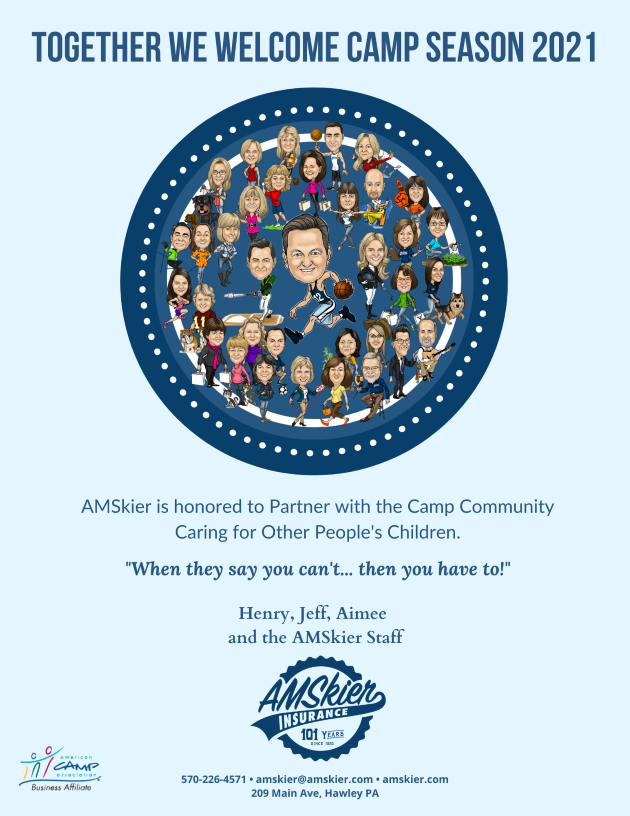Transitioning to your very first supervisory role can be a formidable task, and it's only natural to be nervous. While each employment situation is unique, being a camp supervisor can invite further challenges because of the added responsibilities of managing participants' health and safety in addition to overseeing staff and developing your team.
As a younger supervisor, you may encounter challenges in building credibility and gaining others' respect. Or, if you have been promoted from within to a supervisory position after working at camp for multiple seasons, you may also face challenges associated with the change in roles. This is especially true if your new position includes supervising staff with whom you have already established relationships, such as co-counselors, long-standing friends (or even last summer's romantic interest).
While there is no magic formula for being a good supervisor, you can take steps to develop skills that will help you transition into your new position and ensure your success as a first-time supervisor.
Managing Your Role
Be sure you clearly understand the expectations, objectives, and responsibilities of the job. When supervising programs or other camp areas, this should include knowing each one's specific rules, policies, operational procedures, etc. When supervising staff, be sure you understand any responsibilities you may have in staff training, the camp's performance evaluation process, enforcement of staff policies, or the release of employees.
- Be a role model: Be prepared to represent the camp by modeling excellence, ethics, dedication, and the character expected as a leader at your camp. Staff and campers will be watching you; pay attention to what you say and how you act. You will be expected to model the attitudes and behaviors to be practiced by staff, including following and enforcing the camp's personnel policies, rules for staff conduct, and safety practices, as well as setting the appropriate tone in activities.
- Become a time management master: At camp, time is often intensified in that a day at camp is like a week in real life. Once camp gets rolling, everything counts; there are no time-outs or do-overs, and it's easy to get overwhelmed. There will be deadlines, demands, and lots of changes — in schedules, weather, staffing, activities, and more. Being a supervisor at camp requires that you be a problem solver who is able to balance your own needs, the needs of staff, and the needs of the camp. Good organization skills are critical. This includes being intentional in allocating time for yourself (doing your laundry, taking downtime, etc.) as well as time to perform the tasks required in your position, such as observing and evaluating staff, lesson planning, or equipment inspection and repair.
- Maintain your emotional balance: Supervising others isn't easy, especially when conflict arises or staff fail to do their job. You will experience a range of feelings including stress, disappointment, frustration, and anger. First and foremost, you need to stay in control of your emotions and respond rationally. You will lose credibility with and respect of staff (and campers) if you demonstrate poor impulse control or are highly reactionary. Rather, you must maintain your emotional equilibrium and self-control to face various situations confidently and successfully. Don't communicate with others when angry; wait until you are calm and rational to discuss the behavior or incident. If needed, ask for help in developing strategies for dealing with emotional situations and specific solutions for handling staff and camper behavior.
- Ask for help: Becoming a supervisor does not mean you need to have all the answers or that you are ready to handle all problems alone. Seeking help is not a sign of defeat or inadequacy. No one expects a supervisor to be perfect, and you are probably going to make some mistakes. Don't hide the fact that you are having an issue, especially when you are unsure of the appropriate action or are unable to deal with a particular situation. Ask for assistance. Camp administrators would rather take the time to answer your questions and provide guidance than to have to contend with poor results.
Managing Relationships
You are not a peer. You are not a pal. You are a supervisor. You may need to modify preexisting social relationships at camp, which can be a difficult concept to wrap your head around and particularly tricky in the super-social atmosphere of camp. This does not mean you cannot be friendly, but you do need to be intentional in creating and maintaining a professional distance between yourself and those you supervise — including friends from prior summers.
- Make decisions to get the job done: As a supervisor, you will have to make decisions in the best interest of the camp, which may include decisions that are unpopular with other staff. When supervising the work of others, you will be required to coach, reprimand, and create positive performance changes with staff and/or in program areas. Strive to be respected, but do not expect to be liked. Don't take this personally; you are doing your job.
- Apply rules equally: Be consistent in the application and enforcement of policies, in the dissemination of work, and in the discipline you apply. Make clear to all staff that the rules apply to them regardless of their position, number of years they have worked at camp, or their relationship (current or prior) with you. Favorable treatment (real or perceived) can lead to problems with staff morale, create trust issues, or even lead to charges of discrimination.
- Maintain confidentiality: Discretion is sacred. Do not share or discuss personnel issues regarding any staff member with anyone other than your supervisor (or as directed by Human Resources). Supervisors don't always have the ability to share everything with employees. Staff will respect and trust you more if they understand confidentiality won't be broken.
- Remember the Golden Rule: Treat others as you want to be treated. Demonstrate that you truly value staff; people are any supervisor's real asset. Don't use your power or authority to take advantage. Remember that a key part of success in your role is your ability to develop and maintain positive relationships with staff and among staff groups.
Managing Successfully
Prevent problems by helping staff learn, grow, and succeed. Take time to share your wisdom, knowledge, skills, and expertise. Sometimes staff are unsure of their ability to excel. You can play an important role in helping them to discover their talents and encouraging them to exceed their own expectations. Staff will be much more receptive and cooperative if you are genuinely concerned about them and their achievements. At the end of the day, their success is your success.
- Praise success: "Catch" your staff doing good things and then praise them. The more you focus on finding the good, the more good you will find — and the more they will do. Reinforced behavior becomes repeated behavior.
- Be where the action is: Successful supervisors know what is going on. You cannot manage the work of others from behind a desk or from inside your cabin. Be visible and accessible. Get out to where those you supervise are working. Keep up with how things are going — this will allow you to check the pulse of your areas and help prevent problems. Try to schedule desk-work tasks during times least likely to impact your ability to be accessible to staff.
- Be approachable: Staff should not hesitate to approach you with their concerns and problems. Make sure you build enough trust and openness between you and your staff for them come to you with their ideas as well as their grievances.
- Maintain open communication: Talk to your staff every day and throughout the day. Staff are more likely to come to you when having a problem if you keep the lines of communication consistently open. Communicate with them when things are going right, not just when they are going wrong. Ask for feedback and input. Make sure staff have the information they need and want. And take special care to communicate on subjects that directly impact their jobs. People feel more respected when they're kept in the loop.
Managing Conflict and Correction
Supervision is not a matter of liking or disliking a staff member. Always correct staff in ways that focus on the issues rather than on personalities. Focus on the actions — performance, behaviors, and conduct. Never reprimand based on personal issues you may have with an individual. And don't avoid addressing issues or interacting with a staff member because they cause you anxiety or annoy you. Things left to fester seldom improve.
- Deal with conflict: Conflicts will not resolve themselves over time. Avoiding dealing with dissension will typically result in the situation getting worse — including when there are personal problems between camp staff. The conflict itself — along with the underlying cause(s) — must be addressed and worked through. As a supervisor, be prepared to diffuse situations and to help staff learn from discord, so they can avoid similar disagreements in the future.
- Give constructive feedback: Congratulate staff when they meet expectations. Correct staff when they fail to do so by using their mistakes as teaching opportunities. Be a good listener, praise their effort, and give feedback that clearly explains what is required for them to become team superstars.
- Be honest when there is a problem: Staff can't change their behavior if they don't know it is a problem. Don't wait to discuss an issue with a staff member; make them aware of the problem at the time it occurs. This leaves less room for staff to misremember the act in question or misinterpret your concern.
- Use correction as an educational process: The best opportunities often come in times of adversity. Recognize that problems are a normal part of work and approach them as an occasion to find solutions rather than place blame. Whenever possible, correction should be about helping employees understand what's expected of them, solving problems, achieving desired levels of performance, and getting results. Discipline isn't an action that you must take against staff for misbehavior. Rather, it can be an educational process to engage staff in meeting their job responsibilities. Remind them of the duty they're not fulfilling and provide them with the opportunity to correct the problem. Focus on what they could or should be doing, give examples, brainstorm solutions, and be encouraging.
Like any new opportunity, growing into your supervisory role will have both its rewards and challenges. Remember to be patient with yourself and set realistic expectations for your job performance in this new position. Keeping the management skills outlined here on your mental checklist should help you show your team that you are capable, caring, and trustworthy.
Photo courtesy of Camp Stevens, Catalina Island, CA.
Diane Tyrrell, CCD, MA Ed, has over 30 years of professional experience working within the camp, youth development, and education fields with for-profit and nonprofit organizations. Diane is the owner and CEO of Frog Pond Consulting, providing development, training, and risk-management solutions to help meet ever-changing challenges for universities, private schools, camps, recreational facilities, and nonprofit organizations. She can be reached at [email protected].






